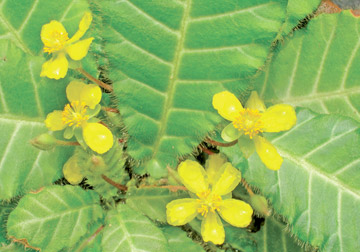|
Exports likely to exceed 2008 earnings:
Floriculture booms in foreign market
By Dhaneshi YATAWARA

Acrotrema uniflora - a native plant developed into a potted
plant

Chirita - hybrid created by local scientists |
It's spring time for the Sri Lankan floriculture industry while the
sector is blooming across the globe particularly in many Asian
countries, as a subsistence replacement to agriculture. This is a live,
growing industry in the world with an estimated average growth rate of
10% which is with a broader potential of providing direct and indirect
job opportunities.
Presently floriculture products are exported mainly to European
countries. In order to expand the world market it has been suggested to
have proper and steady trade links with countries especially the Middle
East and the Eastern Europe, the Netherlands, Japan, and the USA which
account for nearly half of the world trade. In 2008 export earnings from
floriculture products was around US$ 15 million (Rs.1500 million).
Floriculture exports in 2008 included 48% live plants, 46% fresh
decorative leaves and 6% cut flowers. This was a turning point in the
history of floriculture industry as in its inception in 1980s the
foreign income was just around Rs. 1.6 million. "Since Sri Lanka has a
diverse climatic condition suitable for numerous crops we have a greater
potential to turn the floriculture industry profitable," Dr. Siril
Wijesundara, Director General of the Department of National Botanic
Gardens told the Sunday Observer explaining the expansion of the
industry in Sri Lanka. "This is an industry with several advantages. It
supports small, medium and large scale business ventures, has both the
global and domestic market perspectives and is related to nature," Dr.
Wijesundara further explained. According to Dr. Wijesundara the ability
to use marginal lands for these cultivations, having a skilled labour
force and the potential to provide more jobs to local people are the
other plus points.
In Sri Lanka three broad categories can be identified in the industry
- i.e. large scale export oriented enterprises, middle level and small
scale ventures. The first group which is export companies involved in
large scale export businesses is responsible for most of the profits of
the industry. The middle level growers, being recent entrants to the
export market, deal with a limited quantity of export produce. The third
group, small-scale growers, caters only to the domestic market.
Our floriculture industry produce cut flowers, cut foliage,
ornamental foliage plants, aquatic plants, landscaping plants, tissue
culture plants and flower seeds for the world market as well as the
local market.
Constraints
Solutions to limitations and needs of any growing industry, is
crucial especially at a time when the world is facing an economic
recession.
The problems should be addressed immediately and accurately for a
greater impact. "Research and development are the keys to bring
solutions to the needs of the industry as well as to its improvements,"
Dr. Wijesundara added. Surveys done by the Department of National
Botanic Gardens have identified lack of new varieties, lack of
technology and knowledge, inadequate market linkage are the main
constraints the industry is facing.
To overcome these constraints the Department has developed certain
varieties of flowering plants. "This bio diversity wealth could play a
vital role in overcoming this constraint. And another problem faced by
growers is the lack of quality planting material in large amounts for
commonly grown floriculture crops," he added. Sri Lanka has 3771 species
of flowering plants, out of which 926 are endemic. This is 28.3 % of the
total number of species.
Apart from the previously mentioned needs and demands certain other
factors provide a fertile soil for the industry to grow deep rooted.
The 'Green Channel' at the Bandaranaike International Airport
provides a smooth passage for exporting perishable items like fresh
flora. The regional trading hub now developed in South Asia is another
positive towards the growth of the industry. Implementing the industry
is easy since it is of an environment friendly nature. The Department
develops the industry on three angles - i.e. Development of new
varieties, improved growing techniques and empowering the growers. "The
world market for floriculture changes frequently and today there is a
high demand for potted plants and fresh decorative leaves," Dr.
Wijesundara said.
"The new varieties we develop first need to be tested in the local
and export markets to identify the demand. For those varieties receiving
an encouraging response we need to find efficient ways to breed the
varieties," he said highlighting that issues related to Intellectual
Property Rights of new varieties is a crucial matter need to be
considered. Growers need to be made aware of sophisticated management of
pests and disease incidences, risk management due to such incidences and
its prevention.
In order to upgrade the growers to more professional standards the
Department has launched several programs providing on-site advice and
special training programs. The Department has developed a database of
Small and Medium Scale growers and as of to date around 2,000 growers
are listed. In addition a database of Floriculture Scientists is also
prepared by the Department and accordingly today there are 25 such
scientists.
The Suwahas Mal program, a collective of floriculture growers of the
country was initiated by the Department in 2005 with the objective of
capacity building of middle and small scale growers by way of the
following interventions. This initiated and established farmer
organizations in various districts. Its islandwide programs assisted in
infrastructure and human resource development and in marketing the
products. Today 85 grower organisations are active in the Western,
Central, Southern, Uva, Sabaragamuwa and Wayamba provinces. Grower
organisations in selected districts were provided with material for
infrastructure development as well as high quality imported mother
plants for their cultivations. |

